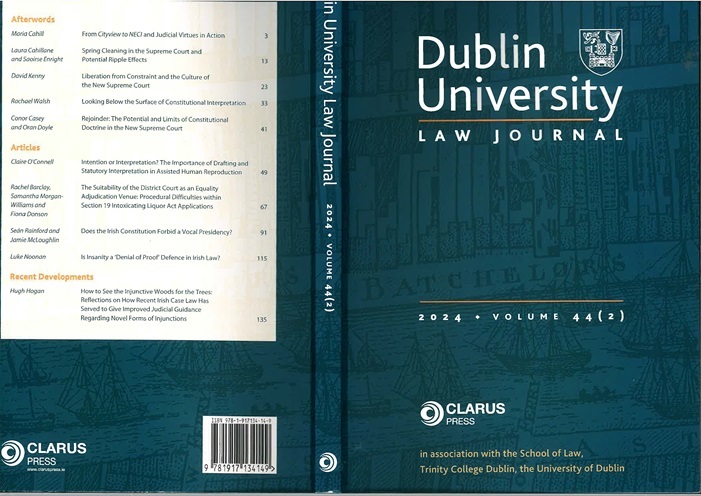CCJHR Research published in latest issue of Dublin University Law Journal

The Centre for Criminal Justice and Human Rights (CCJHR) is pleased to announce that it has published research in one of Ireland’s leading peer-reviewed legal journals.
The latest issue of the Dublin University Law Journal has two published journal articles from CCJHR researchers.
The Director of the CCJHR Dr Samantha Morgan-Williams, Dr Fiona Donson, and Rachel Barclay have published the results of research completed under the Traveller Equality & Justice Project, titled “The Suitability of the District Court as an Equality Adjudication Venue: Procedural Difficulties within Section 19 Intoxicating Liquor Act Applications”.
The abstract reads as follows:
“Litigation in the District Court is an adversarial process with potentially significant financial burdens. This article presents research completed in 2022, which examined licensing and District Court procedures for lodging a notice of application under s 19 of the Intoxicating Liquor Act 2003 (discrimination in a licensed premises). The lack of both clarity and information on the correct manner to commence proceedings under s 19 of the Intoxicating Liquor Act 2003 presents a significant access to justice issue for victims of discrimination occurring at licensed premises. This article argues that jurisdiction of cases concerning discrimination at licensed premises should be shifted to a more suitably established equality venue, such as the Workplace Relations Commission (WRC). It is argued that the wholly unsuitable nature of the District Court acts as a significant deterrent to victims of discrimination and underlies the widespread claim that reform of this means of redress is urgently needed.”
The Deputy Director of the CCJHR Dr Luke Noonan has also published an article titled “Is Insanity a ‘Denial of Proof’ Defence in Irish Law?”
The abstract reads as follows:
“This article considers the nature of the insanity defence under s 5 of the Criminal Law (Insanity) Act 2006, in light of the recent conflicting Supreme Court decisions in Abdi v Director of Public Prosecutions and CW v Minister for Justice. It first discusses the Supreme Court’s decision in Abdi, where the Court unanimously found that the special verdict of insanity was a finding of innocence because it negatived the mental element of the crime. This article critically analyses the Court’s reasoning and argues that insanity under the 2006 Act cannot be conceptualised as a ‘denial of proof’ defence. The judgments in CW are then discussed, which appear to endorse insanity as an excuse defence. The article argues that this interpretation of the defence is also incorrect, before concluding that insanity should be regarded as a doctrine of irresponsibility which cannot be equated with a finding of innocence.”
Details on how to access the Dublin University Law Journal can be found by clicking here.
